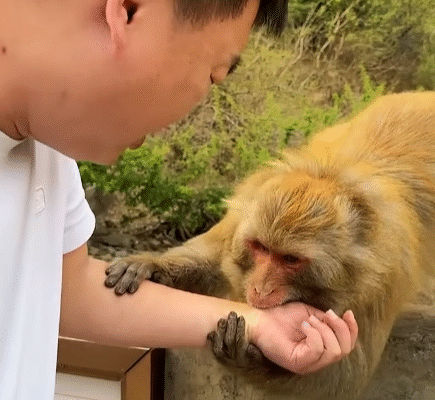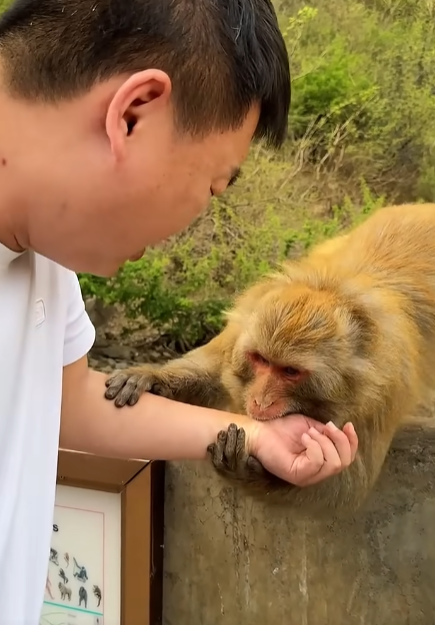
The jungle was unusually quiet that morning, the kind of silence that felt thick and almost intentional. The leaves barely rustled, the birds chirped only occasionally, and even the usual chatter of distant monkeys seemed muted. I had wandered deeper than usual along the familiar trail, carrying a small basket of bananas and mango slices, hoping to surprise my furry friends.
As I approached a clearing, I noticed something strange. Two monkeys were sitting close together on a large, low-hanging branch. They weren’t moving much. They weren’t screaming or squealing. They weren’t fighting over food or playing tricks on each other. They were just… sitting. Watching. Waiting.
Their eyes were fixed on each other in a way that was both curious and hilarious. One was clearly a bit older—bigger, more composed—and the other smaller, with bright eyes that darted around, studying every tiny movement. I stopped and watched quietly. In that silence, it felt like I had stumbled upon a secret conversation, one that didn’t require words at all.
I whispered to myself, “Silence is better than words here.”
The bigger monkey, whom I had always called Moko, seemed to be the leader. He sat upright, chest puffed slightly, surveying the surroundings, but glancing occasionally at his smaller companion, Tutu, who sat cross-legged like a tiny philosopher. Tutu’s little hands fiddled with a leaf, twisting it, rolling it, pretending to examine it scientifically. Occasionally, he would glance at Moko, and something in that look—perhaps admiration, perhaps mischief—made me chuckle silently.
“What are they up to?” I wondered aloud, though I knew they couldn’t hear me.
Tutu suddenly leapt onto Moko’s back, draping his tiny arms around the older monkey like he owned the place. Moko froze, pretending annoyance, but didn’t move. For a moment, Tutu’s head leaned against Moko’s shoulder, and the two of them sat in perfect stillness. The silence between them was almost theatrical. I couldn’t tell if they were friends, siblings, or something more—but one thing was clear: the bond was real.
Then, the comedy began.
Tutu slowly reached into the small pile of leaves near them and pulled out a tiny stick. He waved it in front of Moko, almost like a sword in a duel. Moko’s eyes widened. The tension built. And then, without warning, Moko flicked his tail—and the stick flew straight into Tutu’s face.
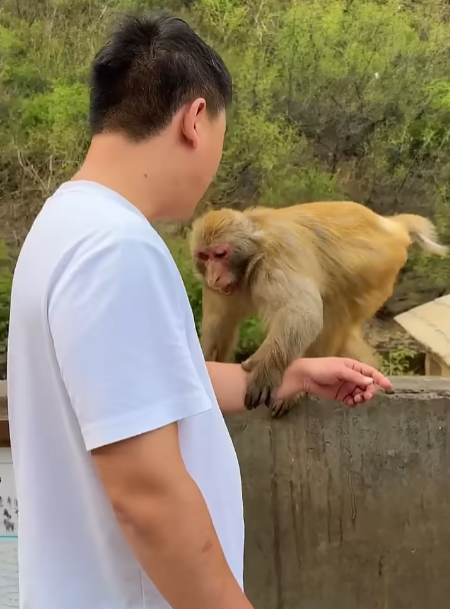
Tutu squeaked and fell backward dramatically, rolling onto the branch like an actor hitting his mark. Moko blinked slowly, as if shocked by his own cunning, then pretended to faint, collapsing sideways across the branch. For a few seconds, they were both perfectly still, the picture of exaggerated suspense.
I couldn’t contain my laughter. I held my hand over my mouth, trying to stay quiet so I wouldn’t disturb the performance.
After a brief pause, Tutu sprang up, leaped onto Moko’s back, and whispered something in that incomprehensible monkey language. Moko nodded solemnly, then suddenly darted forward, causing Tutu to squeal in mock terror as they tumbled across the branch together.
They froze mid-roll for a split second, glancing at each other as if to say, “Do we go for the banana next, or continue the drama?”
And that, I realized, was the essence of their relationship: a perfect blend of mischief and understanding. They didn’t need words. They knew each other so well that a glance, a twitch of an ear, a flick of a tail, communicated more than any spoken sentence ever could.
Tutu then spotted my basket. His eyes lit up. Slowly, almost conspiratorially, he pointed to it. Moko followed his gaze and tilted his head slightly. The next move was obvious: teamwork.
In one fluid motion, they both sprang down from the branch, moving silently toward my basket. I expected chaos—but instead, there was precision. Tutu hopped on top of the basket while Moko stood guard like a seasoned bodyguard. Tutu grabbed a piece of mango and held it up proudly. Moko clapped his hands lightly, making a soft noise of approval.
It was impossible not to laugh silently. Here were two monkeys, having a silent conversation in which every gesture had meaning, and I was the unwitting audience to their comedy.
Tutu, feeling bold, tossed a piece of mango toward Moko—but miscalculated, and it hit the branch above his head instead. Moko’s eyes widened in mock horror. He grabbed the piece mid-air, turned toward Tutu, and held it like a trophy. Tutu squealed, leapt toward Moko, and tried to snatch it back.
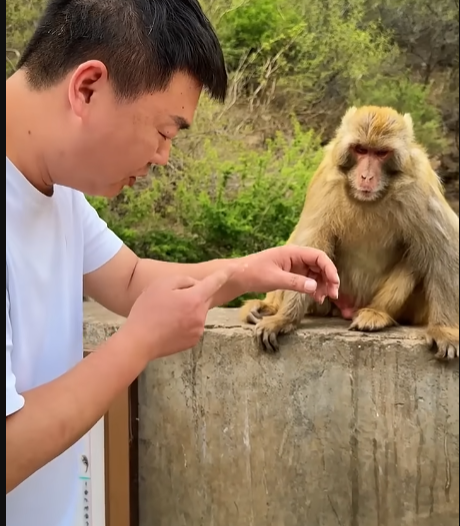
What followed was a slow-motion tug-of-war. They weren’t yelling. They weren’t screaming. They were carefully negotiating with each other using only gestures, squeaks, and exaggerated facial expressions. The world seemed to slow down around them.
Finally, Moko, after pretending to be utterly exhausted, handed the mango slice back to Tutu with the most exaggerated bow I’ve ever seen. Tutu accepted it solemnly, holding the fruit like a priceless jewel.
At that moment, the silence returned.
Both monkeys sat quietly, munching on the mango. Occasionally, they glanced at each other, their eyes twinkling with shared amusement. No words were spoken, but everything was said. It was a relationship built on trust, mischief, and mutual understanding—communicated entirely through gestures, expressions, and timing.
And then came the punchline.
Tutu, now full of energy again, picked up a small leaf and placed it on Moko’s head. Moko froze, glared, then slowly reached up, plucked it off, and tossed it at Tutu—directly in the face. Tutu squealed in shock, fell backward, then leapt onto Moko’s back for revenge.
The cycle of silent comedy continued for hours. I couldn’t believe how intricate their interactions were. Every flick of the tail, every glance, every exaggerated freeze had meaning. I realized that in their silence, they communicated everything: rivalry, love, humor, and cooperation.
Occasionally, they would pause, sit together, and simply observe the jungle. They didn’t need words to enjoy the moment. Just being near each other was enough. And yet, even in those quiet pauses, mischief was never far away. A stray banana peel here, a poke there, a sudden leap that sent the other monkey squealing—it was endless entertainment.
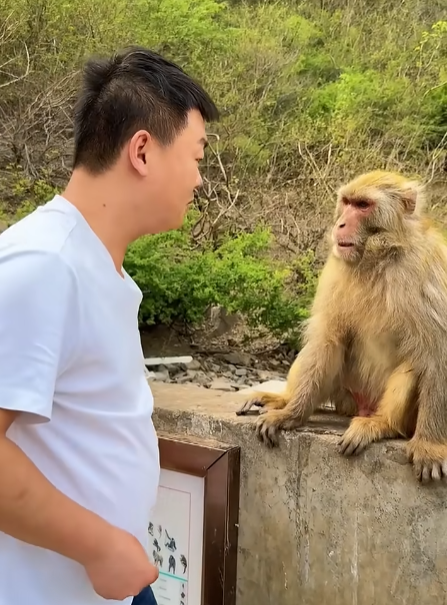
At one point, Tutu noticed a butterfly hovering above the clearing. He pointed silently to Moko, who immediately understood. In perfect synchronization, they both crouched, waiting for the butterfly to land. When it did, Tutu gently flicked it with his tiny hand, and the butterfly flitted away. Moko pretended to be shocked and overreacted as if Tutu had performed magic. The comedic timing was perfect.
By the end of the day, the sun was beginning to set, casting a golden glow across the clearing. The monkeys settled side by side on a branch, still silent but comfortable, tails intertwined. I stood a few feet away, marveling at their bond. It was a friendship, a playful rivalry, and a comedy act all rolled into one.
Silence truly was better than words. Watching them, I realized that communication doesn’t always require language. It doesn’t need explanations or speeches. Sometimes, a look, a gesture, or a well-timed expression says more than words ever could.
As I quietly left the clearing, Tutu looked back, winked, and squeaked softly. Moko nodded in acknowledgment. Their silent farewell spoke volumes. I couldn’t stop smiling.
In the end, their relationship was simple yet profound: two monkeys, different in size and temperament, who understood each other perfectly. They played, they teased, they competed, and they cooperated—all without a single spoken word. And through it all, I laughed, silently, witnessing a bond that was entertaining, endearing, and endlessly funny.
Silence was indeed better than words here. 🐒🐒 And watching their antics, I knew that sometimes, the funniest stories are told without a single sound.
